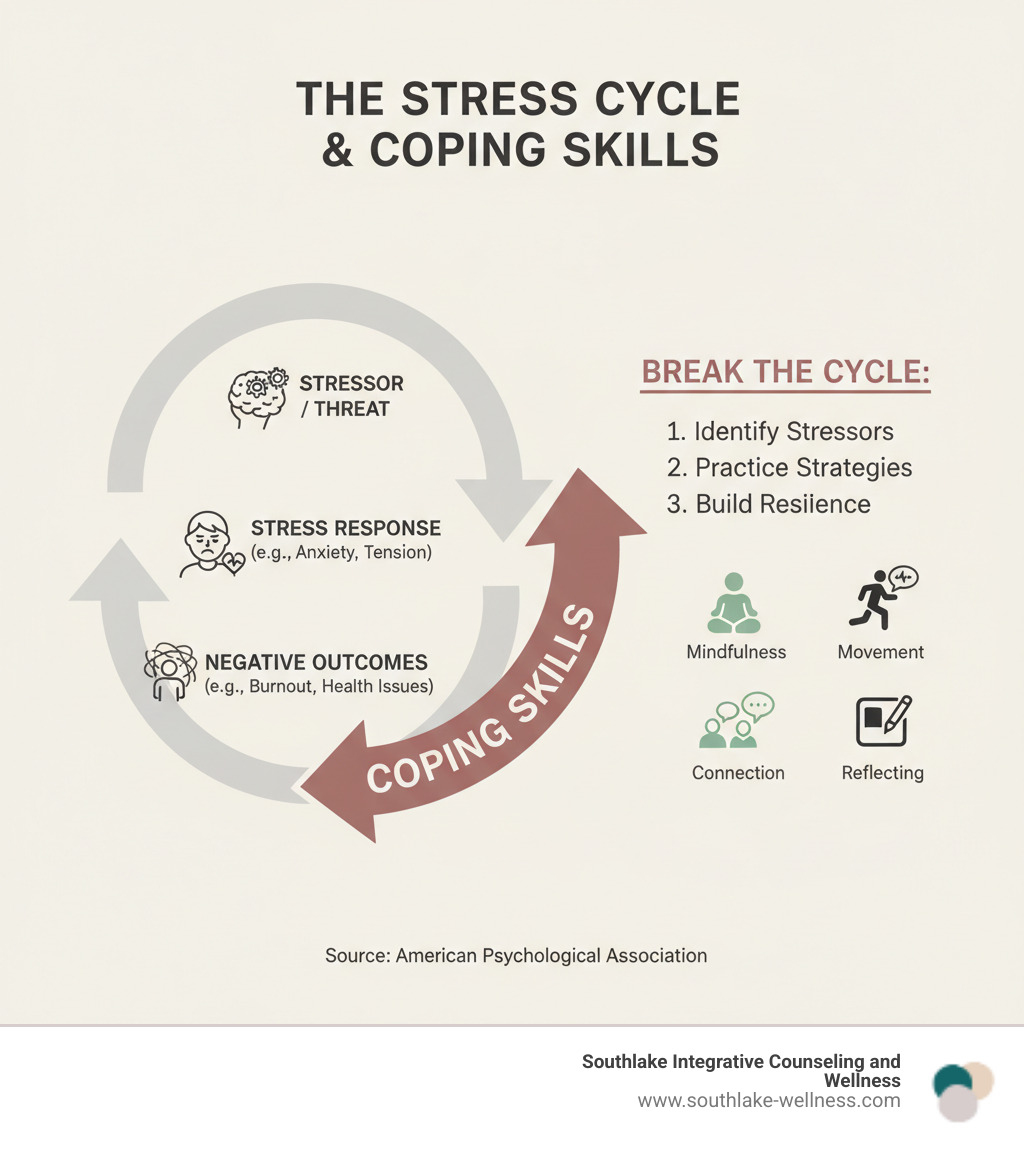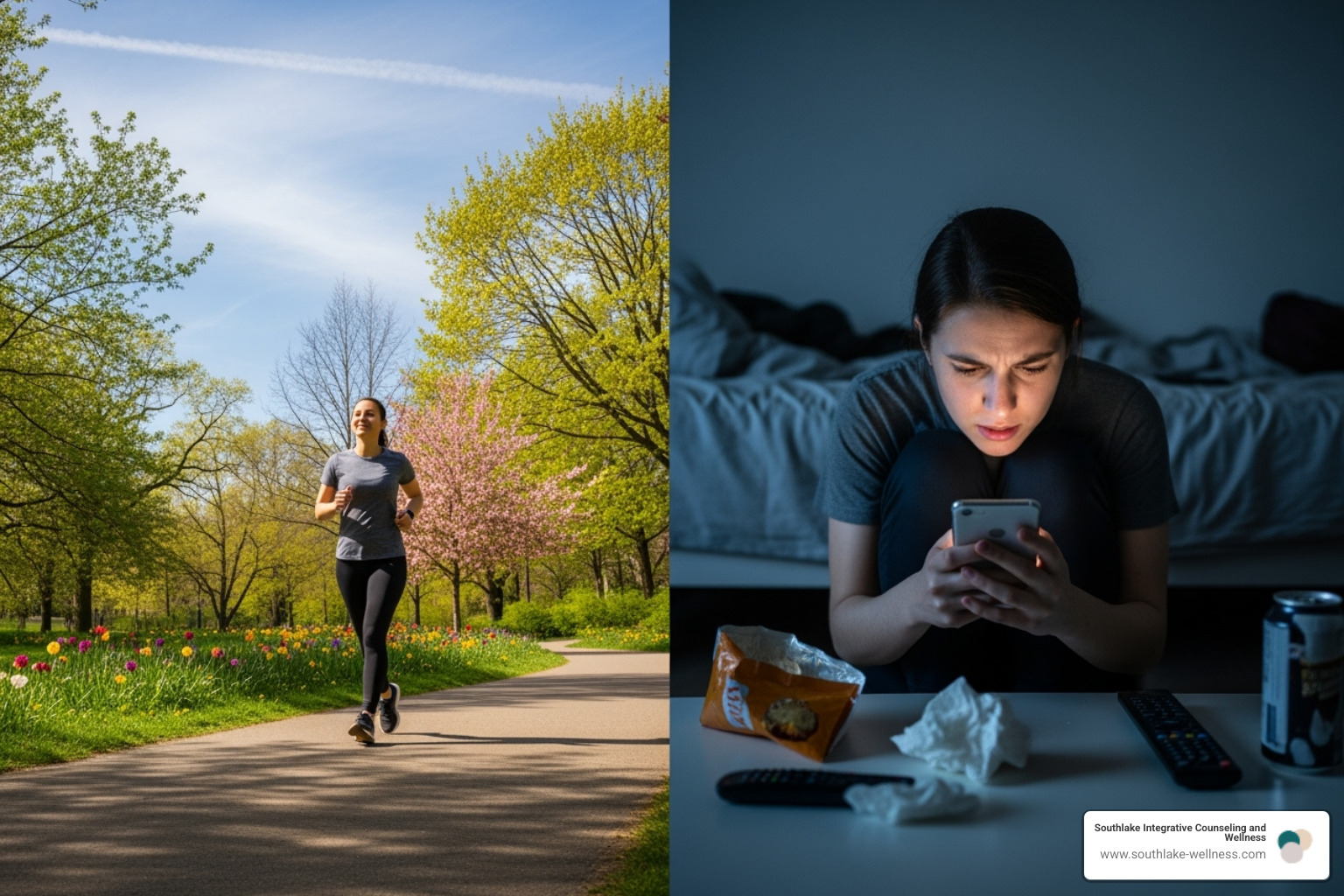
Why Learning to Develop Coping Skills Changes Everything
When you develop coping skills, you gain the power to manage life's inevitable stressors without feeling overwhelmed. These are the practical strategies you use to handle difficult emotions and challenging situations. Lacking effective strategies can lead to anxiety, depression, and physical health problems, as all life changes—both positive and negative—require adaptation.
Quick Answer: How to Develop Coping Skills
- Identify stressors and your current responses.
- Learn the two types: Problem-focused (changing the situation) and emotion-focused (managing feelings).
- Build a toolkit with healthy options like exercise, deep breathing, and talking to friends.
- Practice regularly to make skills automatic.
- Seek professional help when needed.
The good news is that resilience isn't a trait you're born with; it's a skill you can learn. The American Psychological Association defines resilience as adapting well to adversity, and coping skills are its building blocks. The most effective copers are flexible, matching their response to the situation—sometimes solving the problem, other times managing emotions about things they can't change.
I'm Holly Gedwed, a Licensed Professional Counselor Associate. In my 14 years of clinical experience, I've seen how developing these skills transforms lives, helping people move from feeling stuck to feeling empowered.

Understanding Your Coping Style: Problem-Focused vs. Emotion-Focused
To effectively develop coping skills, you must first understand how you naturally respond to stress. There's no single "right" way to cope; the most resilient people are flexible, evaluating a situation and choosing the best strategy. Research shows that successful copers match their response to the stressor.
Psychologists divide coping strategies into two main categories: problem-focused and emotion-focused. Think of them as two different toolboxes for different jobs.
Coping StyleBest Used When...ExamplesProblem-Focused CopingThe situation is controllable and changeableGoal: Change or remove the stressor.
Example 1: Your boss gives you a challenging project with a tight deadline.
Action: Create a detailed project plan, delegate tasks, ask for an extension, or seek clarification from your boss.
Example 2: You're constantly late because of morning traffic.
Action: Find an alternative route, leave earlier, or explore public transport options.Emotion-Focused CopingThe situation is uncontrollable or unchangeable, or when you need to manage feelings before actingGoal: Manage emotional response to the stressor.
Example 1: You receive upsetting news about a situation you can't control (e.g., a loved one's illness).
Action: Talk to a trusted friend, practice deep breathing to calm anxiety, or distract yourself with a favorite hobby for a short period.
Example 2: You've had a bad day at work, and you feel frustrated and irritable.
Action: Listen to calming music, take a warm bath, or journal about your feelings to process them.
Problem-Focused Strategies: Taking Action
Problem-focused coping tackles stress at its source and works best when you have control over the situation. This involves actively working to change or eliminate the stressor. Key strategies include problem-solving (brainstorming solutions and acting), time management (prioritizing tasks and creating to-do lists), asking for help from colleagues or family, setting boundaries to protect your time and energy, and directly changing the source of stress, such as having a difficult conversation or removing yourself from a toxic environment.
Emotion-Focused Strategies: Managing Feelings
Emotion-focused coping helps you manage your internal reactions, which is essential when circumstances are beyond your control. These strategies change how you feel about a problem. Techniques include self-soothing with comforting sensory experiences (a warm bath, cozy blanket), healthy distraction (reading a book, listening to music), and practicing mindfulness to observe feelings without judgment. Emotional processing through journaling or talking to a friend is also vital. Our Emotional Regulation Therapy services can help you master these techniques. Sometimes, simply taking a break by stepping away for a few minutes can reset your emotional state.
Building Your Toolkit: 25+ Healthy Coping Mechanisms
Once you understand the different types of coping, it's time to build your personal toolkit. A variety of options ensures you have the right strategy for different situations and moods. When you actively develop coping skills, you're not just reacting to stress—you're building a foundation of wellness and resilience.

Here is a range of healthy coping mechanisms to get you started:
Physical Actions: Exercise on a regular basis, deep breathing exercises, progressive muscle relaxation, yoga and stretching, getting enough quality sleep, grounding exercises, taking a warm bath or shower, dancing or singing, spending time in nature (hiking, walking)
Mental & Mindfulness Practices: Mindfulness meditation, journaling thoughts and feelings, creating a gratitude list, using positive affirmations, cognitive reframing (challenging negative thoughts), reading a book, learning something new, setting daily intentions, visualizing a happy place
Social & Creative Outlets: Talking to a trusted friend or family member, seeking support from groups or mentors, engaging in a hobby (painting, drawing, crafting), listening to music, helping others (volunteering), playing with a pet, laughter (watching a funny video, reading jokes), making a collage or art piece, connecting with community or faith-based organizations
Physical and Grounding Techniques
Your body holds stress, so physical techniques are crucial for releasing tension. Exercise on a regular basis releases mood-boosting endorphins. Deep breathing directly activates your nervous system's relaxation response. Progressive muscle relaxation helps you identify and release physical tension, while yoga combines movement, breath, and meditation. Prioritizing getting enough sleep is non-negotiable for emotional regulation. When anxiety spikes, grounding exercises like the 5-4-3-2-1 technique can anchor you in the present. Our Holistic Stress Management Techniques guide offers more integrated approaches.
Mental and Mindfulness Practices
Your thoughts shape your experience of stress. Mindfulness meditation trains you to stay in the present moment without judgment; you can find many guided sessions online or through meditation apps. Journaling helps process emotions, while a gratitude list shifts your focus to the positive. Positive affirmations and cognitive reframing help you challenge negative self-talk and thought patterns. Mastering the skill of challenging negative thoughts is a core part of Cognitive Behavioral Therapy. Practicing these skills in a supportive setting like our Mindfulness-Based Group Therapy can also be beneficial.
Social and Creative Outlets
Connection and creativity are powerful buffers against stress. Talking to a trusted friend or family member provides emotional release and validation. Don't hesitate in seeking support from groups or a Therapist Southlake TX, our Advantage of Group Counselling Sessions article explains why this is so effective. Engaging in a hobby provides a healthy escape and a sense of purpose. Listening to music can instantly shift your mood, while spending time in nature reduces stress hormones. Finally, helping others fosters connection and puts your own challenges into perspective. Start with one or two strategies that appeal to you and build from there.
How to Develop Coping Skills and Build Resilience
When you develop coping skills, you're building lifelong resilience. Resilience isn't about being tough; it's the process of adapting and growing through challenges. As the American Psychological Association's Building your resilience guide explains, it's a learnable process of adapting well to adversity. Each challenge becomes an opportunity for personal growth and self-findy.

A Step-by-Step Guide to Develop Coping Skills
Finding what works for you is a personal journey. Follow these steps to build your own effective coping plan.
- Start with self-observation. Notice your triggers and current responses to stress without judgment. This is your baseline.
- Next comes experimentation. Try different skills from the toolkit. Some will click immediately, while others need practice. Give each a fair chance.
- Identify your personal needs. Reflect on which skills made you feel calmer, more energized, or clearer-headed. Honor your personality and lifestyle.
- Create a personalized coping plan. Write down your go-to strategies for specific situations. Keep this plan accessible on your phone or a note so it's there when you need it.
- Track your progress. A simple checkmark on a calendar or a quick journal entry can reinforce new habits and reveal patterns in what works best for you.
- Evaluate effectiveness regularly. Life changes, and so do your needs. Review your plan every few months and adapt it as necessary.
How to Develop Coping Skills for Future Stressors (Proactive Coping)
Proactive coping means preparing for challenges before they arrive. It's about building resilience when you're strong, not scrambling when you're depleted. This involves anticipating challenges by looking ahead at potentially stressful events and preparing emotionally and practically. It also means practicing resource accumulation—nurturing relationships, practicing self-care, and building your mental toolkit when life is calm.
As research on proactive coping shows, this approach significantly reduces the impact of predictable stressors. You can also use goal setting to break down large tasks and mental simulation to rehearse how you'll handle a situation successfully. This shifts you from a reactive to a responsive mindset. These strategies are a key part of a Holistic Approach to Depression and long-term wellness.
Recognizing Unhealthy Coping and Knowing When to Seek Help
Not all coping strategies are helpful. While we work to develop coping skills that serve us, recognize those that don't. Unhealthy coping mechanisms often offer quick, temporary relief rooted in avoidance, but they create more problems in the long run.

Unhealthy Coping Mechanisms to Avoid
- Substance use: Using alcohol or drugs to numb pain can lead to dependency and worse health problems.
- Using food as an emotional regulator: Overeating or restricting often leads to guilt, shame, and physical health issues.
- Sleep as an escape: Excessive sleeping or sleep avoidance disrupts energy cycles and can worsen depression.
- Avoidance: Ignoring problems doesn't make them disappear; it usually makes them bigger.
- Rumination: Endlessly replaying negative thoughts is not problem-solving. A Study on co-ruminating and stress shows it can even increase stress hormones.
- Lashing out: Aggressive outbursts damage relationships and don't solve the underlying issue.
- Complete social withdrawal: Isolating yourself cuts you off from your most powerful support system.
Signs It's Time to Talk to a Professional
Sometimes, our own efforts aren't enough. Recognizing when you need professional support is a sign of wisdom and strength.
- Emotions become overwhelming: You can't function normally due to intense or persistent sadness, anxiety, or anger.
- Healthy coping skills aren't working: Despite your best efforts, you're not feeling better or you keep reverting to unhealthy patterns.
- Stress disrupts your daily life: Your work, relationships, or ability to enjoy life are suffering.
- Persistent sadness or anxiety: Feelings of hopelessness or excessive worry don't lift.
- Thoughts of harming yourself or others: This is an emergency. Call 988 (the Suicide and Crisis Lifeline) or go to the nearest emergency room immediately.
- Unexplained physical symptoms: Chronic headaches, digestive issues, or fatigue can be signs of stress.
A therapist offers an objective perspective and evidence-based strategies like Cognitive Behavioral Therapy. At Southlake Integrative Counseling and Wellness, we provide Personalized Mental Health Care because your journey is unique. Asking for help is a brave investment in yourself.
Frequently Asked Questions about Developing Coping Skills
Here are answers to common questions people have when they start to develop coping skills.
How long does it take to develop a new coping skill?
There's no set timeline. Simple skills like deep breathing may feel effective in days, while complex ones like cognitive reframing can take weeks or months to become automatic. Our brains have neuroplasticity, meaning they can form new pathways with practice. Consistency is more important than perfection. Be patient with yourself—you're building skills for a lifetime.
Can I have too many coping skills?
It's highly unlikely. Think of it like a toolkit analogy: more tools give you more options. The real strength is flexibility—having the right tool for the right situation. However, trying to learn too many new skills at once can feel overwhelming. Start with two or three that resonate with you, master them, and then gradually add more. The goal is a reliable set of tools you'll actually use.
What is the single most effective coping skill?
There is no single "magic bullet" skill. Personalization is key, as effectiveness is context-dependent. A run is great for work stress but impractical in a tense meeting. That said, foundational skills like breathing exercises and mindfulness are highly versatile. They calm the nervous system and are useful in many situations. The most effective skill for you is one that genuinely helps, fits your lifestyle, and that you'll practice regularly. Our Evidence-Based Therapy Techniques are always personalized to fit your unique needs.
Take the First Step Toward a More Resilient You
Learning to develop coping skills is a lifelong practice that empowers you to steer challenges with strength and calm. It's about building emotional muscles that get stronger with use.
We've covered the difference between problem-focused and emotion-focused coping, filled your toolkit with healthy mechanisms, and discussed when to seek professional help. Asking for help is one of the bravest coping skills you can develop.
Resilience isn't something you're born with; it's something you build one choice at a time. Every time you take a deep breath before reacting or call a friend instead of isolating, you are strengthening your ability to handle what comes next.
At Southlake Integrative Counseling and Wellness, we take a holistic approach, understanding that true well-being involves mind, body, and spirit. We're here to walk alongside you on your journey.
If you're ready to build stronger coping skills and move from surviving to thriving, we'd be honored to help.
Explore our holistic therapy services and find how we can support you in creating lasting change.